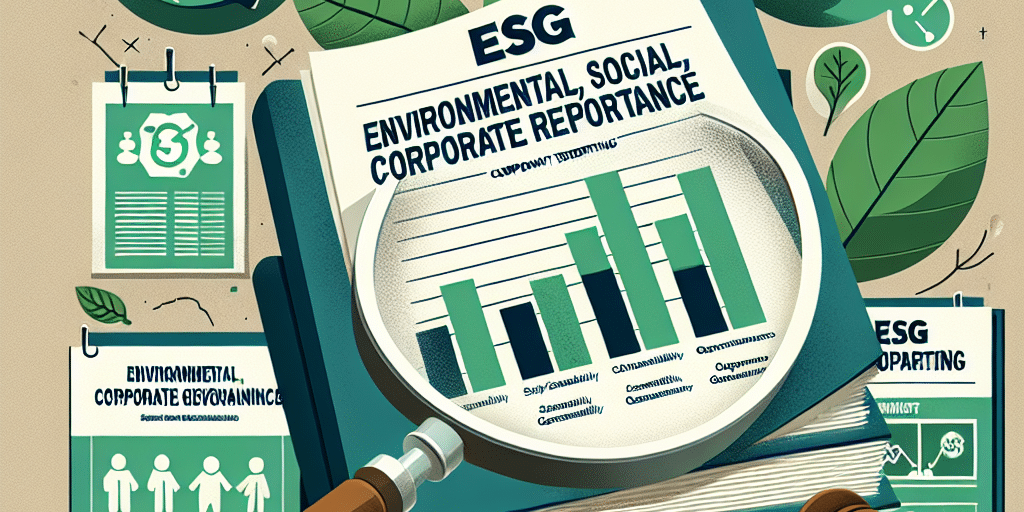In recent years, the business landscape has witnessed a profound shift in how companies are held accountable for their actions. Environmental, Social, and Governance (ESG) reporting has emerged as a pivotal framework for assessing corporate performance, moving beyond traditional financial metrics to encompass a broader range of societal impact. As stakeholders increasingly demand transparency and responsibility, ESG reporting is becoming a cornerstone of corporate accountability, driving transformative changes in organizations worldwide.
The Rise of ESG Reporting
The emergence of ESG reporting can be traced back to a growing recognition among investors, consumers, and regulators that the long-term sustainability of businesses is intricately linked to their social and environmental responsibilities. Rising concerns about climate change, social inequality, and governance issues have prompted stakeholders to seek assurance that companies are operating in a manner that is not only profitable but also ethical and sustainable.
In response, ESG reporting has gained traction as a means to quantify and communicate a company’s commitment to these areas. Various frameworks and standards, such as the Global Reporting Initiative (GRI), Sustainability Accounting Standards Board (SASB), and the Task Force on Climate-related Financial Disclosures (TCFD), have emerged to guide organizations in disclosing their ESG performance, risks, and opportunities.
Enhancing Transparency and Trust
One of the most significant impacts of ESG reporting is its contribution to enhanced transparency. By disclosing ESG-related information, companies provide stakeholders with insights into their operational practices, risk management strategies, and long-term sustainability goals. This transparency fosters trust between organizations and their stakeholders, which includes investors, employees, customers, and communities.
As consumers become more socially conscious, brands that prioritize ESG issues can distinguish themselves in the marketplace. Research shows that consumers are more likely to support companies that are perceived as responsible and transparent, leading to increased customer loyalty and brand reputation. For investors, ESG reporting offers a clearer picture of a company’s risk profile, making it easier to identify sustainable investment opportunities.
Driving Corporate Strategy and Innovation
ESG reporting is not merely a compliance exercise; it is increasingly seen as a critical driver of corporate strategy and innovation. Through the process of gathering and analyzing ESG data, companies gain insights into their operations that can inform decision-making and long-term planning.
For instance, organizations that conduct thorough assessments of their environmental impact may identify inefficiencies in their supply chain or production processes, leading to cost savings and resource conservation. Companies focusing on social factors, such as diversity and inclusion, may find that fostering a diverse workforce enhances creativity and innovation, ultimately driving better business outcomes.
Furthermore, governance structures informed by ESG considerations can bolster risk management, ensuring that a company is resilient in the face of emerging challenges. By integrating ESG factors into their core strategies, businesses are better positioned to navigate a rapidly changing global landscape.
Regulatory and Investor Pressure
The demand for ESG reporting is also being fueled by increasing regulatory requirements and investor expectations. Governments around the world are beginning to mandate ESG disclosures for public companies, recognizing the importance of sustainable business practices in promoting economic stability and addressing global challenges.
Investors are taking a more active role in advocating for ESG transparency, often using ESG metrics as part of their investment criteria. Asset management firms are increasingly employing ESG ratings to inform their decisions, exerting pressure on companies to adopt more responsible practices. This shift is exemplified by the rise of sustainable investing, which has garnered trillions of dollars in assets globally.
Challenges and the Path Forward
Despite its potential, ESG reporting is not without challenges. The proliferation of reporting frameworks can create confusion, and the inconsistency in metrics and disclosures makes it difficult to compare performance across organizations. Furthermore, companies may grapple with the complexity of collecting accurate data, especially in areas like supply chain management and social impact.
To address these challenges, a move toward standardization and harmonization of ESG reporting frameworks is essential. Initiatives such as the International Financial Reporting Standards (IFRS) Foundation’s creation of the International Sustainability Standards Board (ISSB) are steps in the right direction, as they seek to establish a cohesive global reporting framework.
Conclusion
ESG reporting is transforming corporate accountability by providing a structured approach for organizations to evaluate and communicate their impact on society and the environment. As stakeholders increasingly demand transparency, responsible stewardship, and sustainable practices, companies that embrace ESG reporting will not only enhance their accountability but also create long-term value for both themselves and society. The journey toward improved corporate accountability is ongoing, but the transformative potential of ESG reporting is undeniable, heralding a new era of business responsibility and sustainability.











